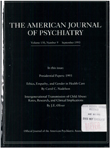Pharmacologic and cognitive-behavioral treatment for bulimia nervosa: a controlled comparison
Abstract
OBJECTIVE: This study examined the relative effectiveness of desipramine, cognitive-behavioral therapy, and their combination in the treatment of bulimia nervosa, together with the effects of withdrawing medication after two different lengths of treatment. METHOD: Seventy- one patients meeting DSM-III-R criteria for bulimia nervosa, recruited from an eating disorders clinic or by advertisements, were assigned at random to one of five groups: desipramine (withdrawn at 16 or 24 weeks), combined treatment (medication withdrawn at 16 or 24 weeks), and cognitive-behavioral therapy (15 sessions). All treatments were conducted individually in an outpatient clinic. The primary outcome measures were binge eating and purging rates assessed at pretreatment, 16, 24, and 32 weeks. The results were analyzed as three groups (medication, cognitive-behavioral therapy, and combined treatment) at 16 weeks and as five groups at subsequent assessments. RESULTS: At 16 weeks, both cognitive-behavioral therapy and the combined treatment were superior to medication given for 16 weeks in reducing binge eating and purging. At 32 weeks, however, only the combined 24-week treatment was superior to medication given for 16 weeks. The combined treatment was also more effective in reducing dietary preoccupation and hunger. Continuing cognitive-behavioral therapy appeared to prevent relapse in patients withdrawn from medication at 16 weeks. CONCLUSIONS: Overall, the results favor the use of a combination of medication and cognitive- behavioral therapy in the treatment of bulimia nervosa, with medication continued for at least 24 weeks.
Access content
To read the fulltext, please use one of the options below to sign in or purchase access.- Personal login
- Institutional Login
- Sign in via OpenAthens
- Register for access
-
Please login/register if you wish to pair your device and check access availability.
Not a subscriber?
PsychiatryOnline subscription options offer access to the DSM-5 library, books, journals, CME, and patient resources. This all-in-one virtual library provides psychiatrists and mental health professionals with key resources for diagnosis, treatment, research, and professional development.
Need more help? PsychiatryOnline Customer Service may be reached by emailing [email protected] or by calling 800-368-5777 (in the U.S.) or 703-907-7322 (outside the U.S.).



